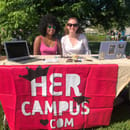We are in the final few days before class registration and after discussing courses with friends and classmates, it has become apparent that there are many courses and professors that were slow in being put into the catalogue and schedule. Without a full “rate my professor” review and those precious two lines or so of summary on the catalogue, many are left anxious about what classes to take. This problem has been striking first year and visiting professors for years and resulting in a small turnout in classrooms on the first day of these classes each semester—it is time to give these professors their rights back. Her Campus has collected a list of courses that are taught by these first year and visiting professors and were chosen because they are particularly useful for those seeking to fulfill their General Education requirements.
Professor Kate Y. DeConinck recently graduated Connecticut College in 2008 with a double major in Religious Studies and English. She is finishing up her PhD at Harvard Divinity, in which she explores 9/ll memorialization through Ethnography. She has an interest in how a society heals from collective trauma. This broad topic may be interesting to English, Government, International Relations, and Anthropology majors. Her courses include:
Religious Studies 241 Trauma, Commemoration, and Celebration
Course Description: An examination of religious and ethical responses to personal and collective trauma. The course considers how cultural and religious contexts can shape acts of memorialization, remembrance, and commemoration. Students will engage with multiple religious traditions and consider cases in national and international contexts. This course will cover topics including 9/ll, Hiroshima, and the Holocaust.
Religious Studes 120 Lived Religion: Stories and Practices
Course Description: An examination of religious narratives and practices in people’s everyday lives. Students read contemporary narrative accounts or ethnographies and also participate in small-scale fieldwork assignments. Consideration is given to the merits and means of understanding religion as experienced variously by people in their diverse cultures.
Professor Stephen Winters-Hilt is a new professor in the Biology and Computer Science departments. His research focuses on fundamental methods in the analysis of data, and in the practical and efficient implementation of such methods for analysis of biological data and for signal processing. Next semester, Professor Winters-Hilt will be teaching:
Computer Science 204 Informatics Programming
Course Description: An introduction to informatics and problem solving with the aid of computers, with applications relating to the natural sciences, social sciences, and humanities. Examples will be implemented using Perl and Python. Students will have the opportunity to explore applications of informatics within their own areas of academic interest.
Biology 298 Genomics, Proteomics, and Bioinformatics
Course Description: An introduction to genomics, proteomics, and bioinformatics, with emphasis on examining genome-scale information. Topics include gene-finder methods, gene homology (or family) identification methods, and other computational techniques for analyzing DNA and RNA sequences. The course will include a survey of the protein ″nanomachines,″ as well as protein families and protein-protein interactions.
Professor Michelle Neely is a new professor to the English and Environmental Studies departments as of this semester who just taught the 300-level Fall Course, “Humans and Other Animals in 19th Century American Literature.” Her research and teaching focus on questions of nature, culture and democracy in American literature before 1900 . Her courses were not included in the printable catalogue and late in their placement in the catalogue and in the schedule. As a result, many people overlooked them, but Her Campus got the details:
English/Environmental Studies 155 American Earth: Puritans to Present
Course Description: An examination of contemporary ecological crises and their cultural origins. The course considers how concepts such as nature, wilderness, and sustainability have been imagined in American literature from the colonial period to the present. Genres range from nonfiction to science fiction. Authors may include Thoreau, London, Abbey, and Butler.
English 325 Occupy American Literature
Course Description: An examination of issues such as inequality, spirituality, consumerism, and happiness, which loom large in contemporary public discourse but which are hardly new. The course considers how materialism and ″the good life″ were represented in American literature from 1630 to 1900. Authors include Bradstreet, Franklin, Hawthorne, and Alger.
Mystery Art Professor!? Professor Wollensak will be on sabbatical, so there will be a visiting professor in the art department who remains unnamed. Whomever this professor is, they will be teaching the following:
Art 224 The Artist Books
Course Description: An examination of the form of the book as a place of inquiry. Emphasis will be on experimental book forms, altering existing books, traditional and digital processes, and their relation to content. Field trips and visiting artist workshops will be incorporated into the semester study.
Good luck with signing up for courses collegiates! We know that registration can be stressful, so check out some of our own tips on de-stressing!

